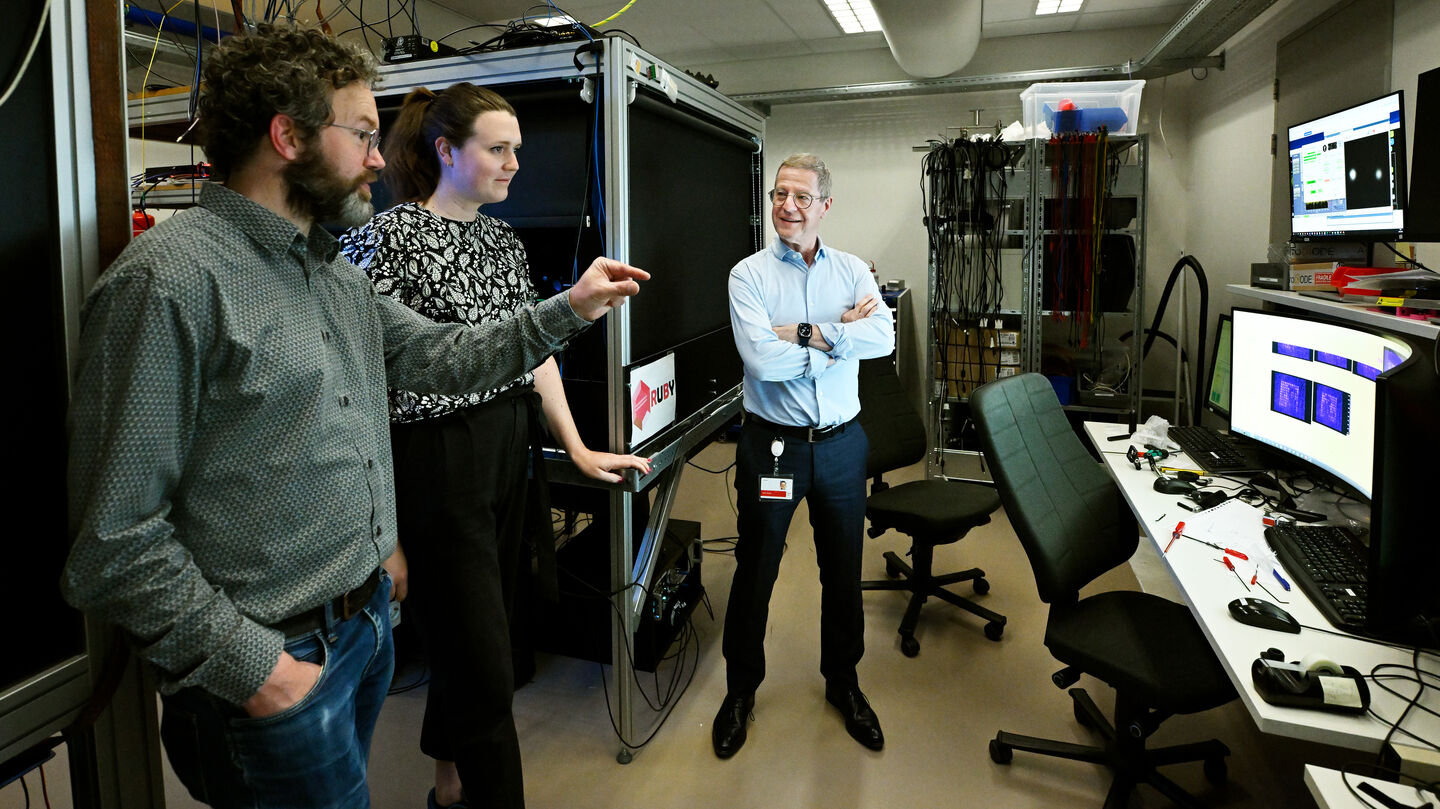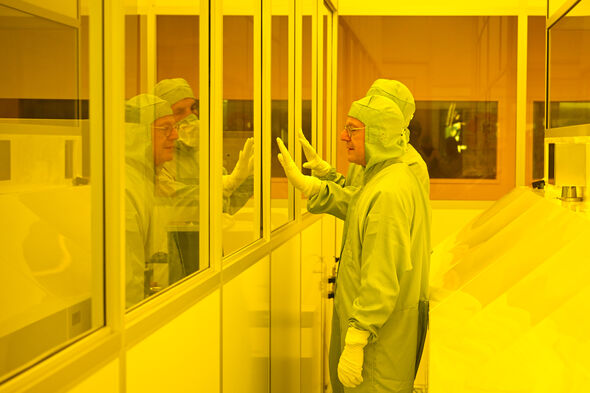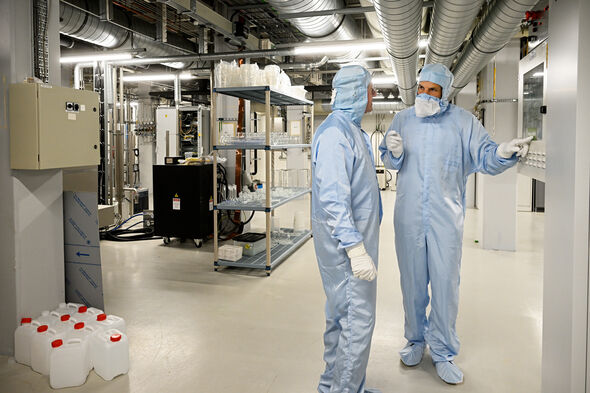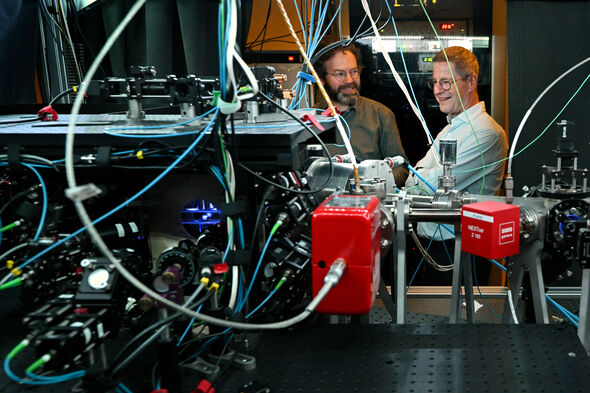
President on the go: asking, listening, seeking direction
Koen Janssen wants to establish focus to guide the university into the next phase
Budget cuts, governance, Beethoven: each of them are important topics, as Koen Janssen is well aware. Still, the new Board president is more focused on connection, collaboration and sustainability. He is in the process of gathering input, and he is involving a lot of people. “Because I think it’s important that the direction we’re taking as a university over the next five years is well embedded and supported.”
He has been walking long distances across campus. In recent and coming weeks, Board president Koen Janssen is visiting one department, research group, support service and study association after another. He is being shown around by deans, professors, researchers and students, asking lots of questions and answering just as many in return. As a former administrator at DSM and TNO, he is very familiar with research and valorization. What is new to him though is the educational setting, the culture and “the political dynamics that come with it.”
So these initial impressions will not lead to any policy plans or strategies just yet, Janssen emphasizes. However, what he hears and sees does help define the course TU/e will take over the next five years. Janssen is in the process of gathering input, and he is involving a lot of people. “Because I think it’s important that the direction we’re taking is well embedded and supported.”
Minimizing the distance
The Board president places strong emphasis on “goal alignment.” “It’s important that we start focusing on a handful of themes that will bring our university into the next phase. Those themes will be established over the next few months in close consultation with various groups. It should be clear to everyone what we stand for and what we’re working towards.”
For Janssen, it’s all about connection, collaboration and sustainability. Connection and collaboration between different departments, between departments and services, and between people from different layers of the organization – because according to the Board president, “everyone matters.” He says that he will not be satisfied until social safety – an area in which the university scored low in the recently published Employee Experience Survey (EES) – has improved during his term as Board president.
Janssen believes that everyone has the right to feel at home at the university, to be offered opportunities and develop their potential. “For me, it’s important to have a clear understanding of what causes these feelings of unsafety – because that’s often very personal. We’re basically running a small village with 20,000 people and 92 nationalities, which leads to complexity when talking about social safety.”
Another goal of his is to minimize the distance between people. He immediately sets a good example by choosing to sit among the deans rather than across from them during their meeting with the Executive Board. “It’s all about teamwork.”
Primary focus
Not only are all people equal to the new Board president, he also considers all areas of the university to be equally important. Janssen recognizes the perception that all eyes are on the so-called “Beethoven departments” – ME, APSE, EE, and M&CS – which are tasked with training 2,000 additional master’s students over the coming years for the region’s semiconductor industry.
“It’s true that the primary focus is on these departments, because clear agreements have been made about this with the government, companies and other educational institutions in the region. However, our other departments are indispensable as well, in part because, as a university, we want to provide the semiconductor industry with a comprehensive package.”
So much amazing research is being conducted, the Board president remarks during his walk around the campus. “Take Industrial Design, for example: a department whose creative concepts respond to what society needs. If we integrate those ID competencies more into other departments, we can combine them with our technical ingenuity. There’s real potential here.”
Exceptional position
When focusing on the internal organization, it is impossible to ignore the budget cuts affecting all services and departments, Janssen acknowledges. “This will mean discontinuing certain activities, postponing them, or doing things in a different or smarter way. That’s not always a fun process. But what’s important is that it’ll allow us to rebuild sufficient equity capital to invest and better withstand future setbacks.”
Janssen points to TU/e’s exceptional position under the current political circumstances. “Thanks to the support of companies in the region and the Beethoven funds, we are fortunate enough to be able to retain all our staff. In addition to extra master’s students, we will also have room for additional support staff and researchers in the coming years, and we’ll be expanding our facilities with a new cleanroom and lab building for the semiconductor industry.”
Governance, the way an organization is led and managed, affects all processes, Janssen knows. “That’s why it’s important to gain insights first. This builds support and ensures a successful implementation of change. The organizational structure is the final piece of a much larger trajectory. It should support the primary processes of education, research and valorization.”
Better decision-making processes
Final piece or not, one thing is clear to Janssen: there is room for improvement in the decision-making processes. “Who is responsible for which decisions, and with what mandate? If that’s unclear, it leaves room for discussion, and if there’s a lack of decisiveness, everyone will start filling in the blanks themselves.”
According to the Board president, better decision-making processes are also a way to reduce work pressure and workload across the organization – which is something that needs to be addressed at the university, according to the Employee Experience Survey (EES). And that brings us to sustainable employability, the third and final theme in his internal introduction triptych: connection, collaboration and sustainability.
Main photo: Koen Janssen (right) receives an explanation from Servaas Kokkelmans and Yuri van den Werf about the functioning of the quantum computer | All photos in this article are by Bart van Overbeeke.
One of the departments that Board president Janssen visits in his first weeks is Applied Physics and Science Education (APSE). On Tuesday, he was given a tour of the cleanroom in Flux and the quantum computing lab in Qubit. As a trained chemist, “his heart starts to race” in this “playground” where he “could happily spend hours.” So it comes as no surprise that this is not his first time wearing protective gear in a dust-free lab space. Research on semiconductors and quantum computing in an educational setting is new to him, though.
Janssen is especially curious about how the equipment works, whether it is sustainable and whether the research finds its way into society. In the space below the cleanroom, where we find the gas and water pipes, the laser equipment and the machines’ pumps, he asks whether the used water is recycled and whether green hydrogen is used. The answer to his first question is yes, and to his second, it’s “not yet”, says professor Erwin Kessels.
Integrating sustainability
While taking off the cleanroom gear, Janssen notes that it is a good thing that the clothes are washed rather than thrown away. “What would be a dream come true for me,” he says, “is if we stopped treating sustainability as a separate theme, and instead integrated it into everything we do here at the university. That would also make the university more attractive to students. For them, sustainability is a no-brainer.”
The cleanroom has about three hundred users – 60 percent from within the organization, and the rest are from industry. The cleanroom would not be here without investments from industry and from the National Growth Fund, says Kessels. “That’s why we’re working together with all the cleanrooms in the Netherlands.” Janssen nods approvingly. He is a strong advocate of collaboration.
The quantum computing lab also partially owes its existence to a financial contribution from that same fund, Janssen is told, as he leans forward and squints one eye to study the intricate equipment (which operates on an atomic scale) up close.
“This is the hardware of the quantum computer,” says professor Servaas Kokkelmans. “We designed it right here,” he adds proudly. Janssen finds it incredible and wants to know when this ultra-fast computer will be ready for the outside world. “That’s the next breakthrough we’re working towards,” says the professor.
Conveying the message
“Everything that’s happening here at the university is so special,” the Board president concludes. “We need to communicate that much more often and in understandable language, both inside and outside our own community.”
Kokkelmans is pleased to hear that. “I feel support for what we’re doing here. In the past, we’ve had to do a lot of lobbying ourselves. If others can take over that task for us, we can concentrate on our work.”




Discussion